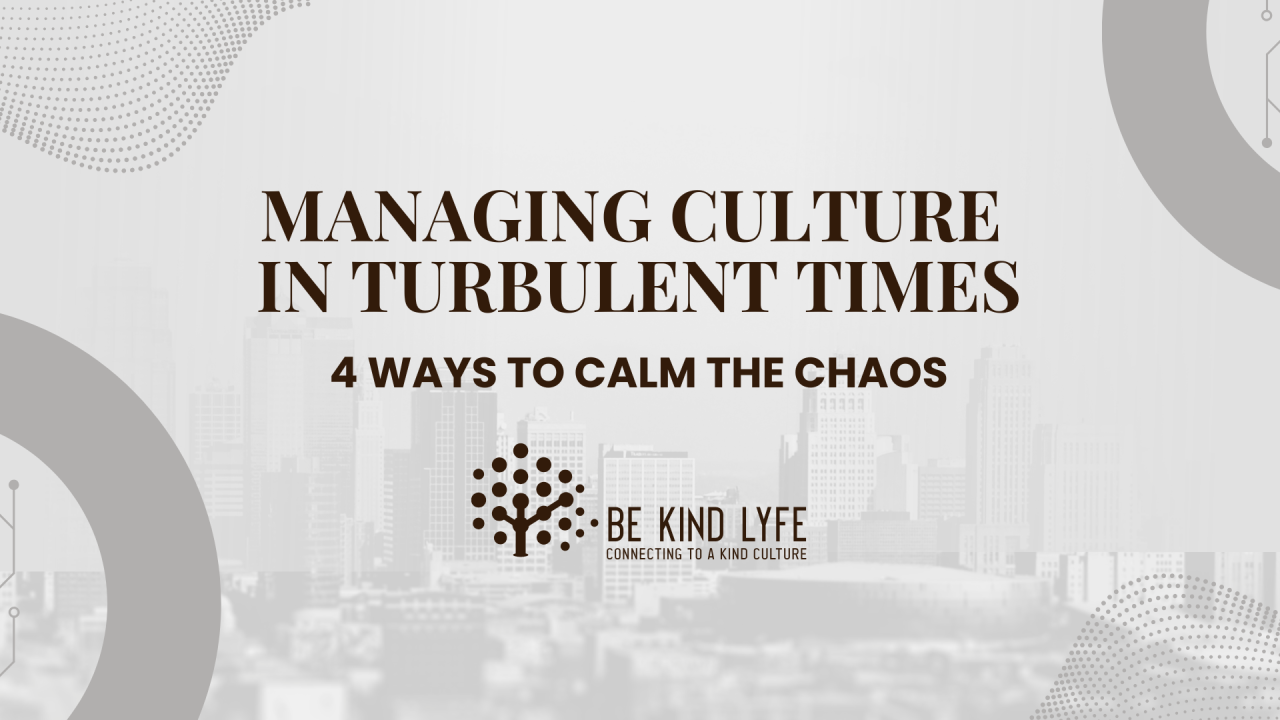Managing Culture in Turbulent Times

Right now feels like a harder time than usual to manage a business, especially with employees. Chaos makes the workplace feel like you’re fighting uphill, while it’s raining, in soft mud.
Layoffs. AI transformations. Market instability. Political turmoil. Organizational stress. Leadership turnover. Welcome to any day in a traditional corporate setting.
When chaos strikes, companies tend to go into “crisis operations” mode. Goals and strategic initiatives can take a serious hit as "panic management" sets in. People get reduced to outputs. The human element — the very culture that holds the business together — is often the first casualty.
And yet, it’s the one thing you can’t afford to lose.
Managing company culture isn’t a “nice-to-have.” It’s a survival strategy. I know, I keep repeating this. IT'S INTENTIONAL. Culture is not built during moments of ease. It’s revealed — and either fortified or fractured — during times of uncertainty.
So, what does it actually take to steward a resilient company culture when everything feels like it’s on fire?
1. Communicate Before You Have All the Answers
Of course you don't know what's going to happen — and as leaders, we feel like we should always have all the answers. When we don't, we delay!
We often delay communication until there is a “complete plan.” The problem? Silence breeds fear faster than any bad news ever could. And the one thing we know is: if you don't communicate, someone will fill in for you — often with the wrong information.
Transparency is trust. Imperfect, timely communication is better than a perfect memo delivered too late.
- Share what you know, even if it’s incomplete.
- Acknowledge the uncertainty.
- Invite feedback (and actually listen).
In chaos, communication IS culture.
2. Rethink “Wellness”
Throwing a meditation app at your team while asking them to work 60-hour weeks isn’t culture stewardship. It’s gaslighting. Direct, I realize, but we can't be performative when it comes to the well-being of our people.
KIND and resilient cultures have:
- Realistic workloads
- Clear boundaries
- Permission to pause
- Psychological safety to say, “I’m struggling” without penalty
Supporting your people isn’t about perks. It’s about intentional actions. It's about making the workplace a space where people can thrive, no matter the circumstances.
3. Anchor Everything Back to Your Core Values
When everything feels unstable, your company’s core values need to become operational principles — not simply wall art.
Before making decisions ask:
- Are our decisions aligned with what we say we value?
- Are we recognizing behavior that embodies those values?
- Are we holding leadership accountable, too?
When leadership models the values under pressure, culture strengthens. Your people will believe and jump in wholeheartedly with the utmost support.
4. Prioritize Middle Management
Middle managers are your most critical culture transmitters. Yet, they are often overwhelmed, underdeveloped and forgotten (even ignored) in crisis planning.
Invest in them. Train them. Support them. Because no memo from the C-Suite will save your culture if your frontline leaders are burned out and bitter.
Managing culture in chaos isn’t about maintaining “morale.” It’s about preserving meaning.
The companies that will thrive are those who understand that culture is the operating system — not the screensaver.
And make no mistake: leaders are being measured. Not by their quarterly projections or strategy decks, but by how their people feel when everything is uncertain.
Ready to kick "panic management" out and fortify your organization with a resilient culture? Let’s start with a conversation. Schedule a Call Today!
#Leadership #CultureStrategy #ResilientOrganizations #FutureOfWork #KINDempowered

